- Home
- Melina Marchetta
On the Jellicoe Road Page 3
On the Jellicoe Road Read online
Page 3
Each day, at the same time, Jude would return and each day they would be there, led by Webb, whose life could not have been more different to his. Where Webb’s memories of childhood were idyllic and earthy, Jude’s reeked of indifference. Webb read fantasy; Jude read realism. Webb believed a tree house was the perfect place for gaining a different perspective on the world; whereas Jude saw it as perfect for surveillance and working out who or what was a threat to them. They argued about sports codes and song lyrics. Jude saw the rain-dirty valley; Webb saw Brigadoon. Yet despite all this, they connected, and the nights they spent in the tree house discussing their brave new worlds and not so brave emotions made everything else in their lives insignificant. Somehow the world of Webb and Fitz and Tate and Narnie became the focus of Jude’s life.
The next year, as the Cadet buses drove into Jellicoe, Jude was desperate for a sign. A sign that would tell him that things would be the same as the year before. He’d spent most of the year wondering about them. Had they fallen out of love with one another? Did Narnie still have that half-dead look? Had Fitz got himself into trouble? Had they outgrown him?
But there they were, on the steps of the Jellicoe General Store, where the Cadets always stopped to pick up supplies. Waiting. For him.
“Who are they?” the Cadet sitting next to him asked.
Jude looked at Webb’s face, the grin stretching from ear to ear.
“They’re my best friends. I’m going to know them until the day I die.”
Chapter 3
The territory wars have been part of the Jellicoe School’s life ever since I can remember. I don’t know who started them. The Townies say it was the Cadets from the city who have been coming out here for the last twenty or so years. They set up camp right alongside the Jellicoe School for six weeks each September as part of their outdoor education program. We say the Townies started the wars because they think Jellicoe belongs to them, and the Cadets blame us because they say we don’t know how to share land. All I know is that they began sixteen years ago because that’s what the Little Purple Book says. In it the founders wrote down the rules, the maps, the boundaries.
The wars take place only for the six weeks the Cadets are here and mostly they are more of a nuisance than exciting. It takes us double the time to get to town because the Cadets own most of the easy access trails. It’s always around that time that we get pep talks from the teachers and the Principal about getting out there in the fresh air and taking bushwalks. What they don’t know is that most of the House leaders confine their younger students indoors in case they trespass onto enemy territory. That is one thing you don’t want happening. Because after the Cadets are long gone and the Townies are back in their rabbit holes, the real war begins. The Houses are at one another, particularly if one was responsible for losing us territory. When I ran away with the Cadet three years ago, Raffaela and Ben went looking for me and trespassed onto Townie territory. We lost the Prayer Tree because of it. Raffaela and Ben were completely ostracised and when I returned we didn’t talk to each other much. Then we stopped talking altogether. And now here we are leading Houses together and about to fight a war.
There are Cadet sightings on the northern border of our boundaries for a whole week. The area is at least a kilometre away from where they are camped so allowing themselves to be sighted is a deliberate attempt at intimidation. Just between you and me, it works every time. The other House leaders want me to begin acting on the intelligence we’re receiving, but premature action in the past has been the Jellicoe School’s downfall and I’ll be damned if I make the same mistakes the leaders have made in the past.
On her weekend visit home, I send word through Raffaela to the leader of the Townies that we’d like to make contact. We receive no answer and the cat-and-mouse games begin. Waiting for war is a killer. Not knowing when the first strike will happen, not knowing what the outcome will be. The build-up makes us tense. Sometimes I want to walk right out there and yell, “Bring it on!” just to get the suspense over.
But it’s the home front that’s the worst. The school has always had a policy that the House leaders, with the help of the rest of the seniors, take care of their own Houses with the assistance of an adult. Every student knows that the leader has been chosen in year seven and is groomed for the next five years. But every year we have elections and pretend that the House leaders and School leader have been elected by the people for the people. The teachers fall for it. They’re pretty young and clueless. Most of them only stay three years maximum to fulfil the Board of Education’s employment requirements, so patterns among the students aren’t really picked up. They are diligent, though. Each time a Lachlan student forgets to turn up to a sports training session or music recital or debating practice, I get harassed by the teachers. From the junior dorms on the first floor all the way up to the year-elevens rooms on the third, those in my House drive me insane with their expectations. Questions about television privileges, duty rosters, computer access, and laundry. There are tears and fights and tantrums and anxiety. And Hannah is nowhere to be found. I’m furious that she has let me take care of this all by myself—almost like some kind of payback for the last time I saw her. In the past Hannah spent most of her spare time in Lachlan, helping out the House leader, but now that I’m in charge she’s gone into hiding.
A year-ten girl knocks on my door. “Evie from year seven just got her period.”
“So?”
“You have to speak to her. She’s crying.”
“Go get Raffaela.”
“She’s not around. Where’s Hannah? How come Ms. Morris is doing roll call?”
“I have no idea where Hannah is.”
I recognise the look on the girl’s face. It’s a do-you-have-any-idea-about-anything look.
“I’ll go get Hannah,” I say finally, just wanting to get away. Except when I go down to her office and turn the handle to walk in I find it locked. In my whole time at the Jellicoe School I don’t ever remember Hannah’s door being locked and I put it down to an extended tantrum, which sits uneasily with me because Hannah never has tantrums. I’m about to head back upstairs but I see Jessa McKenzie coming my way, so I walk out, get on a bike, and ride down to the unfinished house by the river.
At this time of the day our grounds are at their most sinister. I can handle it at night but there’s something about this time, when the sun begins to disappear, that makes me think the grounds have so much to hide. There’s just endless silence. No birds, no crickets. Nothing.
I dump the bike on the ground beside the house and make my way to the front. “Hannah,” I yell out angrily.
But the echo of my voice is the only response.
“Hannah, this isn’t funny!”
I stand in the silence, waiting for something. For her head to appear out the window on the first floor, looking exasperated and saying, “Help me with these skirting boards, Taylor.”
I look around, sensing something…someone. The house has an area around it that Hannah tends and mows. “It’ll be my garden,” she tells me constantly, where she’ll plant lilac and lilies and she’ll sit there, on the front verandah, like in that Yeats poem that she sometimes recites to me:
I will arise and go now, and go to Innisfree,
And a small cabin build there, of clay and wattles made:
Nine bean-rows will I have there, a hive for the honey-bee,
And live alone in the bee-loud glade.
And I shall have some peace there…
But beyond the tamed area there is dense bushland, uncultivated, without even a walking trail. Three kilometres of that is what separates us and the Cadets. Rumour has it they’ve been creating a secret trail for years, which would make getting to us as easy as. The quickest way for them would be via the river, which flows directly behind Hannah’s property. But it belongs to us. Here, near Hannah’s house, the river is at its narrowest and there’s only about twenty metres between the banks. In the last couple of years, beca
use of the drought, the river has been not much more than a trickle. Once in a while, over time, we’ve almost lost it through poor leadership but somehow we’ve always managed to hold on to it and maintain that physical distance between us and them. Today, though, somewhere in that dense uncultivated labyrinth, something or someone is watching. I can feel it with everything I have inside of me that keeps me alert to malevolence.
“Who’s there?” I call out.
I think of the cat. Although Hannah has never claimed him as hers, she feeds him every time he comes into the area. I hate the cat and the cat hates me. He’s feral, with a tail that always looks like it’s been caught in a state of fright, and, like everything to do with Hannah, I fight him for her attention.
“Why does he look like that?” I asked her once.
“Because I think he saw something that scared the hell out of him a very long time ago.”
The cat has been dying for years and sometimes Hannah wants to put him out of his misery, but she doesn’t have the guts. Sometimes, when I get up close to him, I see the suffering in his eyes, but then he’ll scratch me on the face and I am forced to forgo the sympathy.
But whatever is out there now, it’s not the cat.
I shiver. Whoever it is has the advantage of being able to see me when I can’t see them. I decide to turn around and walk away but just as I do, I hear the crunch of footsteps somewhere behind the bushes, moving towards me, slow and measured.
“Jessa McKenzie, is that you?”
If it was Jessa, she’d answer, and there is no answer, just the sound of a presence that keeps me rooted to the spot. I want to walk towards my bike, but I dare not turn my back and I’m too much of a coward to step forward to investigate. So I stay, for what seems like forever, staring at that one spot, frozen like a soldier who’s stepped on a landmine. I don’t move. I try to convince myself that it’s just my imagination. That there’s nothing there but some kind of wildlife with a size-nine foot.
The cold begins to snap at my skin and it’s getting darker. Cautiously I take a step back and then another and another. I can make a dash, grab the bike, get on it, and take off before whoever it is can make it out of those trees, but some kind of eerie fear keeps me transfixed. I count to ten but I reach eleven and count to ten again and reach eleven again. Eleven. Eleven. Eleven. Eleven. Eleven.
Ten!
I bolt, turning, racing round the back of the house, straight to the bike. My stomach turns. No bike. Any chance of it all being my overactive imagination is quashed when I see that empty space under the tree. I hit the path with all the speed I can muster, my heart thumping like a rampaging jackhammer. The trail is an obstacle course of tangled twigs and assaulting branches, but I’d know this area with my eyes closed. I can hear only two sounds: the pounding of blood in my brain against my temples and the footsteps behind me. One pair. If there were two or more I think I’d be less afraid. I’d just allow myself to be captured and reinforce the rules of the Jellicoe Convention about diplomatic immunity. But one pair means either a rogue operative…or something worse.
When I reach the clearing that leads to the Houses and I see the lit path in front of me, there’s no sense of relief. My lungs are bursting and every part of me aches. I just want to reach that door and the closer I get to it the farther away it feels.
Then I’m there, flying through it, slamming the door shut, locking it. Only then do I lean against it, sliding to the floor, taking deep gulps of air, slowing down my heart rate, pushing my perspiration-matted hair off my face, and bending my head between my legs, feeling for the reassuring shape of my inhaler….
Three year-seven girls are standing in front of me, Jessa McKenzie in the middle of them.
“Someone used up all the water,” Chloe P. tells me.
“Celia’s got matches,” the other one, whose name I don’t know, says in a hushed voice.
I get up slowly, ignoring them, dragging my body up the stairs, but they are still there beside me.
“Where’s Hannah?”
I stop and look into Jessa McKenzie’s eyes and suddenly I see someone…something that I have seen before. I feel an anxiety I can’t explain.
I push past them and escape to my room and when it’s securely locked, I walk to the basin and lean over it, nausea rising in me.
I want to see Hannah. I’m not sure why but I find myself repeating the need over and over again. Because it’s like a voice whispering in my head telling me that there is something so unnatural about her absence. It’s like the last line of Hannah’s Yeats poem.
I hear it in the deep heart’s core.
At lunch I’m forced to sit with the other House leaders in the food hall as part of our “official” prefect initiation. The Principal makes a speech about unity while Richard whispers to the leader of Hastings. She giggles at something he says and they look at me until she passes it on to the person next to her. Richard has the rest of the House leaders eating out of his hand, except for Ben who is hoeing into his lasagne with a passion. I know that I need to act quickly before there’s a coup and as I glance around the table I realise, once again, that my only potential ally is a drop-kick moron with tomato sauce all over his face.
“Ben, make contact with the Cadets. Tell them I’m ready to make a deal.”
Ben looks up, in the middle of wiping the plate with his bread, his eyes wide with shock.
“Me?”
“Him?” Richard exchanges glances with the others.
“You,” I say.
“What are you doing, Taylor?” Richard asks in that voice of his with the warning in it.
“I’m asking my deputy to do what deputies do. To negotiate,” I say politely, standing up.
Ben mouths deputy to me like it’s a dirty word and then Raffaela walks by and he mouths deputy to her as well and even she looks a bit worried.
“And by the way, Murrumbidgee and Hastings House,” I say, looking at both the girl and Richard. “I read the Little Purple Book last night. Written in 1986 by the first of the UCs. The leader, I think, referred to himself as Chairman Meow. Pretty bad handwriting, but it’s all there, including the fact that no House leaders can fraternise with each other in a romantic sense. Don’t know why but probably because it takes away the competitive edge.” I look at Ben. “Let’s go.”
Raffaela follows us as well. I don’t say a word until we get outside.
“Where were you last night?” I ask her.
“I got town privileges. My best friend’s brother’s best friend’s teammate—”
“Get to the point.”
“—had a message for me. The Townies are ready to meet us. Tonight.”
The halfway hut where negotiations take place with the Townies is dark and musty. The flashlights offer little light and no one dares sit down for fear of sitting on the unknown. In front of us there are three Townies. I only recognise Chaz Santangelo, far too handsome for his own good, but at least he doesn’t have that mean, hard, feral look that Townie leaders from the past have had. Santangelo’s sidekicks are typical hoons. Is there a manual out there that says Townies have to have mullets? Raffaela beside me is fidgety and I figure that they are all waiting for me to begin negotiations.
“So let’s make a deal,” I say.
“What makes you think we’re here to make a deal?” Santangelo asks.
“Because river rats don’t usually warn us that they’re coming up to see us. They usually cruise around the place and create havoc and then expect us to negotiate just to stop the mayhem.”
“I don’t operate that way…we don’t operate that way.”
Judging by his sidekicks I’m not too sure.
“Well then, Santangelo. Is that what I should call him?” I turn to ask Raffaela. She doesn’t answer. She’s still fidgeting.
“Chaz,” he answers for her.
“Santangelo…Chaz, whatever they call you down there, let’s make a deal.”
“Then you start. Tell us what you wa
nt.”
First rule of negotiation: never let them think you want something.
“We want access to the Prayer Tree,” Raffaela blurts out.
Raffaela failed negotiating class in year eight. The seniors in our House once had her in mind for leadership after I went through my arsonist stage and burnt half of the oval. We have a collection of arsonists at our school. There are at least two in year seven in my House who are going to set fire to us in our beds one day.
“We want access to the Club House,” Santangelo states bluntly, looking at me and not her.
“Club House isn’t ours. It belongs to the Cadets.”
“Yeah, but it’s a massive hike for them unless you let them use the river. They want access to the path that leads to it, and you’ve got that.”
“Why the Club House?” Ben asks.
“Limited options. We can’t get into any of the pubs, so it’s hanging out at the Seven-Eleven at night or the car park at Coles. We’re looking for peaceful coexistence, here. One night a week, Saturday night, maybe even two.”
“You’re talking to the wrong people. The Cadets will never allow you in.”
“They might if you give them access to the path.”
I shake my head. “The path is too close to the school boundaries.”
“And the problem is?” he asks.
“We have junior girls,” Raffaela says. “We don’t want strangers that close to our boundaries.”
“Why? Because last time the Cadets got that close you ran off with one of them?” The three Townies exchange looks and I am suddenly suspicious.
“You don’t know who you ran off with, do you?” one of the Mullets says, stepping towards me. “You are one stupid—”
“Is this the best you can do?” Raffaela snaps at Santangelo, pointing to his morons, her finger almost an inch away from the bigger Mullet. He growls and makes a bite for it and Ben drags her back.

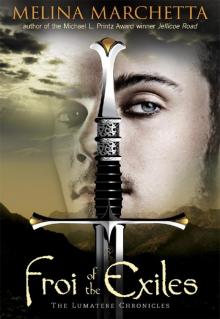 Froi of the Exiles
Froi of the Exiles Finnikin of the Rock
Finnikin of the Rock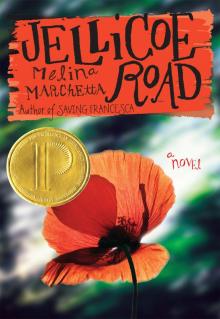 On the Jellicoe Road
On the Jellicoe Road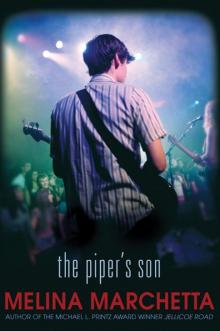 The Piper's Son
The Piper's Son The Place on Dalhousie
The Place on Dalhousie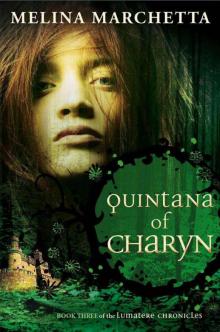 Quintana of Charyn
Quintana of Charyn The Lumatere Chronicles: The Complete Trilogy
The Lumatere Chronicles: The Complete Trilogy What Zola Did on Tuesday
What Zola Did on Tuesday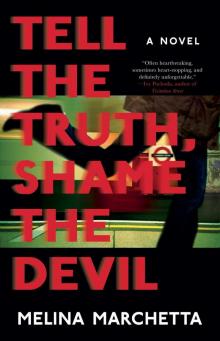 Tell the Truth, Shame the Devil
Tell the Truth, Shame the Devil Looking for Alibrandi
Looking for Alibrandi What Zola Did on Monday
What Zola Did on Monday Froi of the Exiles lc-2
Froi of the Exiles lc-2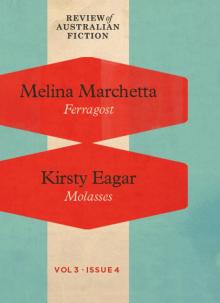 Review of Australian Fiction, Volume 3, Issue 4
Review of Australian Fiction, Volume 3, Issue 4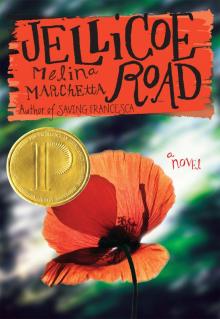 Jellicoe Road
Jellicoe Road Froi of the Exiles: The Lumatere Chronicles
Froi of the Exiles: The Lumatere Chronicles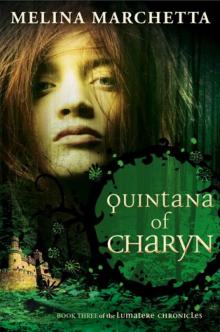 Quintana of Charyn lc-3
Quintana of Charyn lc-3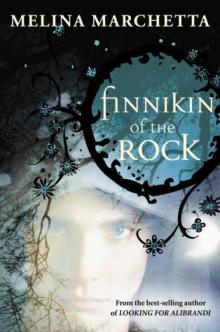 Finnikin of the Rock lc-1
Finnikin of the Rock lc-1 The Lumatere Chronicles
The Lumatere Chronicles